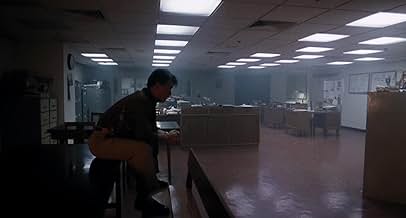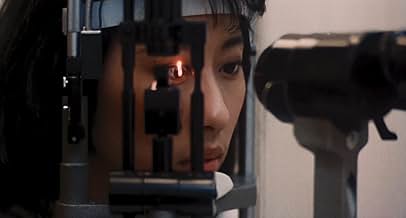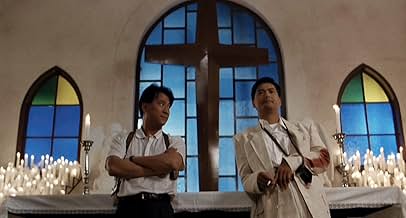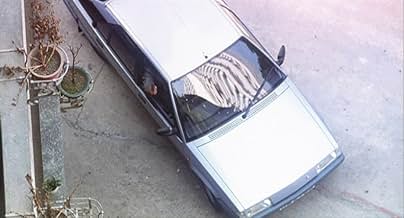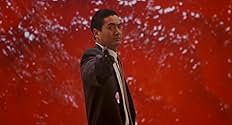ÉVALUATION IMDb
7,7/10
53 k
MA NOTE
Un assassin désabusé accepte un dernier job dans l'espoir d'utiliser ses gains pour redonner la vue à un chanteur qu'il a accidentellement aveuglé.Un assassin désabusé accepte un dernier job dans l'espoir d'utiliser ses gains pour redonner la vue à un chanteur qu'il a accidentellement aveuglé.Un assassin désabusé accepte un dernier job dans l'espoir d'utiliser ses gains pour redonner la vue à un chanteur qu'il a accidentellement aveuglé.
- Prix
- 2 victoires et 6 nominations au total
Chow Yun-Fat
- Ah Jong
- (as Chow Yun Fat)
Kong Chu
- Sydney Fung
- (as Chu Kong)
- …
Kenneth Tsang
- Sgt. Tsang Yeh
- (as Tsang Kong)
- …
Shing Fui-On
- Wong Hoi
- (as Shing Fui On)
Ricky Chun-Tong Wong
- Frankie Fung
- (as Fan Wei Yee)
Chuen Chiang
- Shooter at beach
- (uncredited)
Chin-Hung Fan
- Shooter at beach
- (uncredited)
Woon-Ling Hau
- Trash lady
- (uncredited)
Avis en vedette
10Anardil
Before seeing a genuine Hong-Kong produced John Woo movie, I thought I knew what action was, and what the action-movie genre was capable of. I was wrong. The Killer was the single most impressive, awe-inspiring, jaw-dropping action movie I had seen in years, and is now one of my favourite movies of any genre. It is #2 on my all-time list.
Why? First of all, the well-known poetic violence of the super-charged action scenes make for a tremendously exciting film. These combine choreographed bloodshed (there is an almost constant stream of bullets) with raw emotion that puts even the best Hollywood actioners to shame. Look at Hollywood action movies today; almost all Hollywood action is inspired (not to mention plagiarised) from the "heroic bloodshed films," the best of which is The Killer.
Quentin Tarantino and Robert Rodriguez are only the most obvious examples of American directors to put Woo's trademark stylized violence to use, and neither handle it as well as Woo.
But beyond this, the characters and the story are what drive this movie and what truly set it apart. The story of the relentless cop and the vicious killer is only the latest in a long line of detective stories, starting with Arthur Conan Doyle and Edgar Allan Poe in the 19th century, and continuing in every cop show on TV today. The hero and the villain are practically the same; they are only divided by an almost arbitrary line called the law. In The Killer, both "Mickey Mouse" and "Dumbo" are unrelenting, capable, though misunderstood, professionals. Their motivations differ, but they both have the killer instinct. The classic storyline of the interaction of the two characters who eventually realize their similarities and end up working together has been seen before, but never has it been used to such effect as in The Killer.
Woo's familiar themes of brotherhood, betrayal and loyalty also reach their cinematic peak in this movie. The viewer not only wants to see the next pyrotechnic action scene, but is actually concerned with the lives of the characters, an element that is almost always lacking in typical Hollywood fare.
Finally, the gun-battle scenes, when they come, are simply the most spectacular, mind-blowingly violent, yet strangely beautiful, action scenes ever imagined or filmed. And last but not least, is the unbelievably powerful screen presence of Chow Yun-Fat, as always cool incarnate. His effortless lead and the tension created by his playing off of co-star Danny Lee make The Killer as close as I have yet seen to the perfect action movie. I recommend it to any hard-core action fan and also suggest Hard-Boiled, though Woo's American efforts thus far have not been up to his Hong Kong works.
Rating: 10
Why? First of all, the well-known poetic violence of the super-charged action scenes make for a tremendously exciting film. These combine choreographed bloodshed (there is an almost constant stream of bullets) with raw emotion that puts even the best Hollywood actioners to shame. Look at Hollywood action movies today; almost all Hollywood action is inspired (not to mention plagiarised) from the "heroic bloodshed films," the best of which is The Killer.
Quentin Tarantino and Robert Rodriguez are only the most obvious examples of American directors to put Woo's trademark stylized violence to use, and neither handle it as well as Woo.
But beyond this, the characters and the story are what drive this movie and what truly set it apart. The story of the relentless cop and the vicious killer is only the latest in a long line of detective stories, starting with Arthur Conan Doyle and Edgar Allan Poe in the 19th century, and continuing in every cop show on TV today. The hero and the villain are practically the same; they are only divided by an almost arbitrary line called the law. In The Killer, both "Mickey Mouse" and "Dumbo" are unrelenting, capable, though misunderstood, professionals. Their motivations differ, but they both have the killer instinct. The classic storyline of the interaction of the two characters who eventually realize their similarities and end up working together has been seen before, but never has it been used to such effect as in The Killer.
Woo's familiar themes of brotherhood, betrayal and loyalty also reach their cinematic peak in this movie. The viewer not only wants to see the next pyrotechnic action scene, but is actually concerned with the lives of the characters, an element that is almost always lacking in typical Hollywood fare.
Finally, the gun-battle scenes, when they come, are simply the most spectacular, mind-blowingly violent, yet strangely beautiful, action scenes ever imagined or filmed. And last but not least, is the unbelievably powerful screen presence of Chow Yun-Fat, as always cool incarnate. His effortless lead and the tension created by his playing off of co-star Danny Lee make The Killer as close as I have yet seen to the perfect action movie. I recommend it to any hard-core action fan and also suggest Hard-Boiled, though Woo's American efforts thus far have not been up to his Hong Kong works.
Rating: 10
10Spiku
First of all, I am disgusted by some of these reviews. Modern action has been overrun by special effects and stuntmen with death wishes (not that I'm complaining), but one must consider the time and the place. It's not the world of the Matrix or the Human-Cyborg War (or whatever it's called) in the Terminator, it's Hong Kong in the 1980's with counterfeiting, hostile Chinese syndicates. It doesn't have to be a big budget feature to be great. Clerks by Kevin Smith had a minute budget, but it made Smith famous.
I digress. Woo creates a sensitive and emotionally complex... assassin. To make him reconsider his job as a professional killing machine Jeffrey, the killer, blinds a lounge singer, Jenny. He swears to himself that he will end his career after one last job. Woo introduces us to the concept, like you see in A Better Tomorrow, that you can never leave a Triad even if you try your hardest. With an hour of attempting, Jeff realizes the horrible truth. Rarely does Woo bring in this feeling of absolute futility in his work. After losing his best friend, Jeff has crossed the Rubicon in his attempts and must end his ties to it by ending his everyone's but his own, excluding Jenny and Inspector Lee. Some people dislike the final shootout, but the doves and the Christian symbology adds a touch that drives religious and heroic bloodshed to the minds of the audience. On a personal note, I love it. The last few seconds depict a man, perhaps Lee, playing a harmonica in front of the church for reasons I don't know.
I digress. Woo creates a sensitive and emotionally complex... assassin. To make him reconsider his job as a professional killing machine Jeffrey, the killer, blinds a lounge singer, Jenny. He swears to himself that he will end his career after one last job. Woo introduces us to the concept, like you see in A Better Tomorrow, that you can never leave a Triad even if you try your hardest. With an hour of attempting, Jeff realizes the horrible truth. Rarely does Woo bring in this feeling of absolute futility in his work. After losing his best friend, Jeff has crossed the Rubicon in his attempts and must end his ties to it by ending his everyone's but his own, excluding Jenny and Inspector Lee. Some people dislike the final shootout, but the doves and the Christian symbology adds a touch that drives religious and heroic bloodshed to the minds of the audience. On a personal note, I love it. The last few seconds depict a man, perhaps Lee, playing a harmonica in front of the church for reasons I don't know.
"Heroic bloodshed" and "gun fu" were sub-genres coined by John Woo during the mid-80s, starting with A Better Tomorrow. This was a film that marked Woo as a rising artist within Hong Kong cinema of the modern age. After making a sequel to A Better Tomorrow, Woo went and directed The Killer, followed by Bullet in the Head and Hard-Boiled, these films proved his talent as a director who was able to illustrate ultra-violence, through what closely resembled ballet (a.k.a. in this sense, a dance of death). These outrageously stylised methods of film-making hastily became noted by Hollywood producers and Woo via a mistake on his behalf- decided to make his move to the place where financing was merely an accessory. Ever since this move, Woo has crafted numerous well-known works of commercial success, but critical failure (unlike his earlier pictures), including the likes of Broken Arrow, Face/Off, Mission Impossible 2 and Windtalkers. Shame, considering these lacked everything that his trademark works created, but can be expected with the restrictions Hollywood producers commonly put in place. Fortunately, his '80s legacy lives on and still has an acute influence on many mainstream directors of today.
The Killer propelled Woo's career, as well as that of Chow Yun-Fat, who took the title role of Ah Jong. Although, he plays an assassin, he is the kind who is out to get "the bad guys", and follows a strict code of honour and ethics. Compassionate, sympathetic and remorseful of the way in which he leads his life, Ah Jong begins to become more cynical of the brutality he savours. After accidentally blinding an innocent singer (who he later falls in love with) during a gunfight, Ah Jong's remorse overwhelms him to such a degree that he becomes determined to get a vital donor that could potentially save her eyesight. In order to finance this, Ah Jong settles a final hit, which soon spirals out of control. Law enforcement inevitably becomes aware of the destruction wreaking its way throughout Hong Kong because of the triads. Nonetheless, the cop on the case happens to be understanding of Ah Jong, and as both relate to each other they start to unexpectedly develop an unexpected partnership.
In 1992, Quentin Tarantino's Reservoir Dogs was released; now, it should be noted that the white suits used in The Killer admittedly inspired those now-infamous black suits. I bring this up because I wish to present one of the main techniques utilised in Woo's 1989, action classic. Such a procedure is contrasting the lashings of blood (shown during the countless fight scenes) against the calm, white clothing. Waving a white cloth, for example, is a sign of retreat, or peace and placing blood on white is an opposing confliction. Transcending everything that most action films can only dream of, The Killer combines a compulsory fusion of intelligence and entertainment. Then there is the paradox (as such) of both the cop and the killer using guns, but for differing reasons. Essentially, both are committing the same acts, through similar methods, but for different reasons. The two men have a certain confidence and an explicit willingness to seek fulfilment and justice, which enables a parable to be crafted between the two individuals.
Edited with a glaring visual stance, filmed through bright colour filters and following bare-knuckled narrative management, The Killer packs a well-placed gut-punch. Engaging the viewer through ultra-cool protagonists and beautifully choreographed fight scenes, this grand, wry take on the idealistic assumption of decency within the world of organised crime remains a work of bloodshed which holds artistic significance. Even with the overly dramatised screenplay (echoing a consistent waft of unsuited, moralistic sentimentality) and the dated '80s soundtrack, the piece is an extravagant and exciting take on a temperamental genre. Containing metaphors (the doves extinguishing the flames on a collection of candles) and the use of a church for a set-piece, the film is vastly unique for what is adrenaline-based action. Saying that, most directors would opt for endless cuts as a means of groping the viewer's attention, Woo on-the-other-hand avoids such an amateurish technique, choosing a cultivated approach. The finished result is a concoction of mind-boggling stand-offs and humanistic undertones, enabling it to become a motivating take on a seemingly predictable genre and an ode to the classic westerns (who said The Wild Bunch?). Remember, Chow Yun-Fat is for action, what John Wayne was for the western.
The Killer propelled Woo's career, as well as that of Chow Yun-Fat, who took the title role of Ah Jong. Although, he plays an assassin, he is the kind who is out to get "the bad guys", and follows a strict code of honour and ethics. Compassionate, sympathetic and remorseful of the way in which he leads his life, Ah Jong begins to become more cynical of the brutality he savours. After accidentally blinding an innocent singer (who he later falls in love with) during a gunfight, Ah Jong's remorse overwhelms him to such a degree that he becomes determined to get a vital donor that could potentially save her eyesight. In order to finance this, Ah Jong settles a final hit, which soon spirals out of control. Law enforcement inevitably becomes aware of the destruction wreaking its way throughout Hong Kong because of the triads. Nonetheless, the cop on the case happens to be understanding of Ah Jong, and as both relate to each other they start to unexpectedly develop an unexpected partnership.
In 1992, Quentin Tarantino's Reservoir Dogs was released; now, it should be noted that the white suits used in The Killer admittedly inspired those now-infamous black suits. I bring this up because I wish to present one of the main techniques utilised in Woo's 1989, action classic. Such a procedure is contrasting the lashings of blood (shown during the countless fight scenes) against the calm, white clothing. Waving a white cloth, for example, is a sign of retreat, or peace and placing blood on white is an opposing confliction. Transcending everything that most action films can only dream of, The Killer combines a compulsory fusion of intelligence and entertainment. Then there is the paradox (as such) of both the cop and the killer using guns, but for differing reasons. Essentially, both are committing the same acts, through similar methods, but for different reasons. The two men have a certain confidence and an explicit willingness to seek fulfilment and justice, which enables a parable to be crafted between the two individuals.
Edited with a glaring visual stance, filmed through bright colour filters and following bare-knuckled narrative management, The Killer packs a well-placed gut-punch. Engaging the viewer through ultra-cool protagonists and beautifully choreographed fight scenes, this grand, wry take on the idealistic assumption of decency within the world of organised crime remains a work of bloodshed which holds artistic significance. Even with the overly dramatised screenplay (echoing a consistent waft of unsuited, moralistic sentimentality) and the dated '80s soundtrack, the piece is an extravagant and exciting take on a temperamental genre. Containing metaphors (the doves extinguishing the flames on a collection of candles) and the use of a church for a set-piece, the film is vastly unique for what is adrenaline-based action. Saying that, most directors would opt for endless cuts as a means of groping the viewer's attention, Woo on-the-other-hand avoids such an amateurish technique, choosing a cultivated approach. The finished result is a concoction of mind-boggling stand-offs and humanistic undertones, enabling it to become a motivating take on a seemingly predictable genre and an ode to the classic westerns (who said The Wild Bunch?). Remember, Chow Yun-Fat is for action, what John Wayne was for the western.
Of all John Woo's bullet-ridden action movies, this is his greatest. You see many of Mr. Woo's "trademarks" (flying doves, reflections in mirrors, very strong Catholic symbolism) that appear in his inferior American directed films (save Face Off) first in this Hong Kong cinema classic. Sure the violence is over the top, the plot only adequate, the sentimentalism a little thick. The actions scenes are filmed with such, I dare say beauty, that no Hollywood 'by the numbers' action film can possibly compete. While this film is not for the squeamish or those offended by excessive and rather graphic violence, if you are in any way a fan of action films - you mush see this movie (and many other John Woo directed films during his Hong Kong days, i.e. Hardboiled, A Better Tomorrow, etc).
Chow Yun Fat and John Woo teams up together with strong commitment to this highly melodramatic action film. The Killer was so ahead of its time especially with its signature shootout scenes and fast paced action sequences in its time of production in Hong-Kong. Without any special, visual or sound effects; it's a high achievement on both sound and vision. It's high on thematic values, but low on production values.
Woo benefited a lot from a team of action-coordinators as part of the production crew he assigned with. 20 years from its screen release, today still there are not many action films in which the sequences are coordinated as good as in The Killer. The rest of the production was standing by its plot, which becomes unbearable due to extremely melodramatic events. Woo tries to hurt our feelings as much as he can by killing and injuring innocents so ruthlessly: Passengers on a train, children on a beach, singers at a night club etc.
Lowell Lo's heart-wrenching theme and background music was one of the finest of the thematic values. Story development is also very effective that everything seems going fine at the beginning of Jong(the hit-man)'s last mission, then for he wasn't paid for his successful assassination he decides to show up back from underground with his alias: "Jeffrey". When he did, a stage singer ends up losing her sight and becomes blind from shot blasting. Jong helps her get well; she falls in love with him. He introduces himself as Jeffrey to her. No matter what romance they share together, no matter how close they are to each other; there is absolutely no accordance no chemistry between Sally Yeh and Chow Yun-Fat. Sally Yeh acts so poorly, especially while she keeps screaming needlessly every other scene.
For whoever likes this film, I strongly advise Léon to them. The same idea also works in Luc Besson's film, too: In a hit-man's life; there is no certain way to go, there is nobody to trust, there is no repentance. In Luc Besson's film of 1994, Jean Reno and Natalie Portman builds up a better harmony using emotions but not melodrama.
Additionally in John Woo's film, even though Chow Yun-Fat is not fast enough he just stands by the bullets by running, or guards himself with armchairs and seats of the cathedral which are vulnerable to bullets with the gaps between backrests. So many bullets are used... Were they shot by children or blind hitmans? How could you explain not getting shot while 4 hitmans are aiming at you running inside the cathedral and running on the beach? On the other hand, every single bullet that's used in Léon, hurts one person or another; or leaves marks, tracks and holes on walls, and in the texture of the floor. It's not an acquirement to waste 10 thousand bullets in a movie; but it's really an achievement when you configure a sub-production plan just to preview and review the bullets in both pre-production and production.
Woo benefited a lot from a team of action-coordinators as part of the production crew he assigned with. 20 years from its screen release, today still there are not many action films in which the sequences are coordinated as good as in The Killer. The rest of the production was standing by its plot, which becomes unbearable due to extremely melodramatic events. Woo tries to hurt our feelings as much as he can by killing and injuring innocents so ruthlessly: Passengers on a train, children on a beach, singers at a night club etc.
Lowell Lo's heart-wrenching theme and background music was one of the finest of the thematic values. Story development is also very effective that everything seems going fine at the beginning of Jong(the hit-man)'s last mission, then for he wasn't paid for his successful assassination he decides to show up back from underground with his alias: "Jeffrey". When he did, a stage singer ends up losing her sight and becomes blind from shot blasting. Jong helps her get well; she falls in love with him. He introduces himself as Jeffrey to her. No matter what romance they share together, no matter how close they are to each other; there is absolutely no accordance no chemistry between Sally Yeh and Chow Yun-Fat. Sally Yeh acts so poorly, especially while she keeps screaming needlessly every other scene.
For whoever likes this film, I strongly advise Léon to them. The same idea also works in Luc Besson's film, too: In a hit-man's life; there is no certain way to go, there is nobody to trust, there is no repentance. In Luc Besson's film of 1994, Jean Reno and Natalie Portman builds up a better harmony using emotions but not melodrama.
Additionally in John Woo's film, even though Chow Yun-Fat is not fast enough he just stands by the bullets by running, or guards himself with armchairs and seats of the cathedral which are vulnerable to bullets with the gaps between backrests. So many bullets are used... Were they shot by children or blind hitmans? How could you explain not getting shot while 4 hitmans are aiming at you running inside the cathedral and running on the beach? On the other hand, every single bullet that's used in Léon, hurts one person or another; or leaves marks, tracks and holes on walls, and in the texture of the floor. It's not an acquirement to waste 10 thousand bullets in a movie; but it's really an achievement when you configure a sub-production plan just to preview and review the bullets in both pre-production and production.
Le saviez-vous
- AnecdotesJohn Woo dedicated this film to Martin Scorsese.
- GaffesThe road sign board pointing to the hospital says "SCARED HEART HOSPITAL".
- Autres versionsThe Taiwan version has a scene where it shows Jenny sitting in her dressing room while hearing the gunshots around 5 minutes into the movie.
- ConnexionsFeatured in Century of Cinema: Naamsaang-neuiseung (1996)
Meilleurs choix
Connectez-vous pour évaluer et surveiller les recommandations personnalisées
Détails
Box-office
- Brut – à l'échelle mondiale
- 2 340 425 $ US
- Durée1 heure 51 minutes
- Couleur
- Rapport de forme
- 1.85 : 1
Contribuer à cette page
Suggérer une modification ou ajouter du contenu manquant


